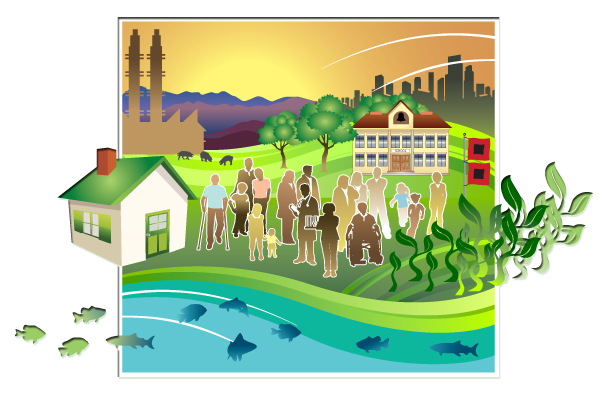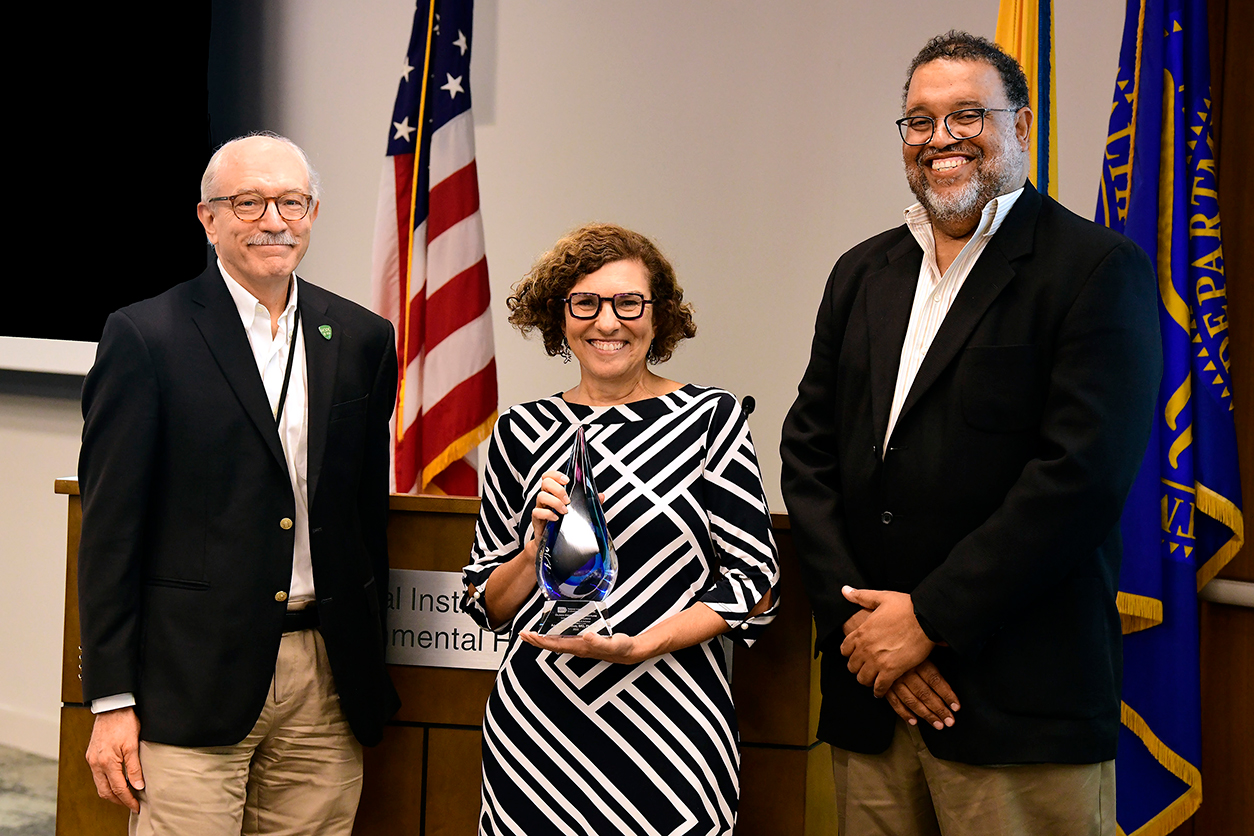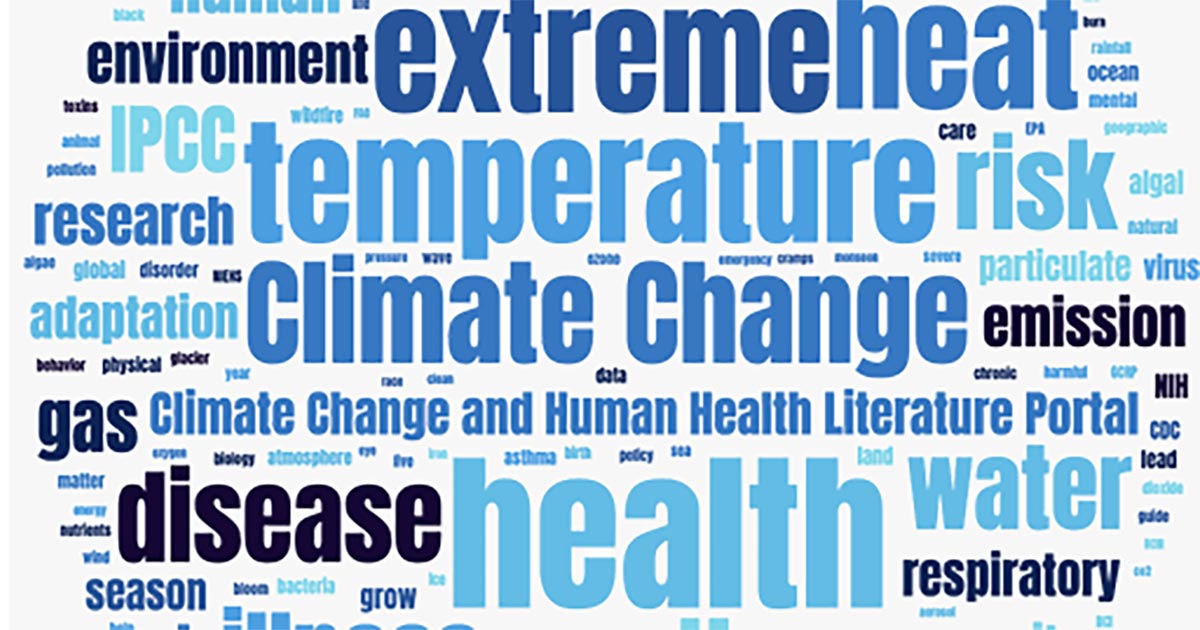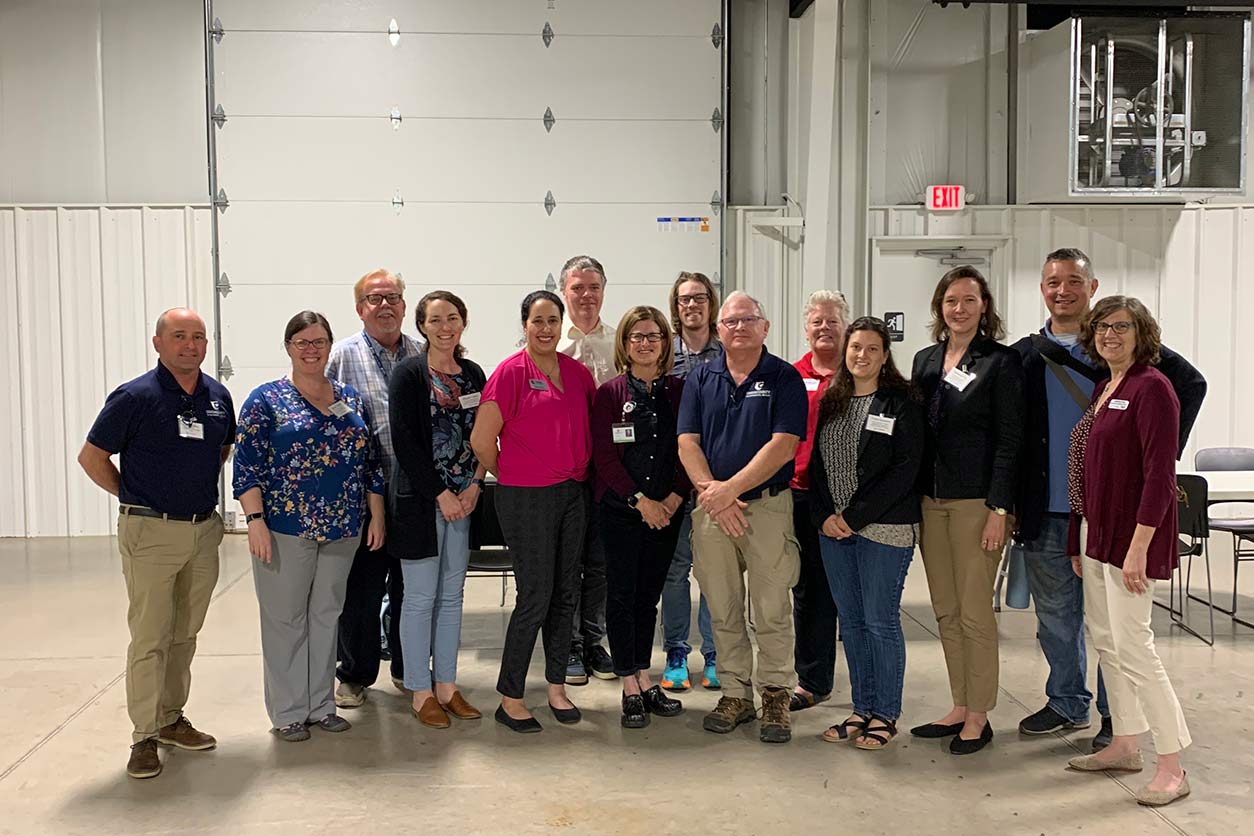Using Photovoice to Develop a Framework of Children’s Environmental Health Knowledge and Experiences
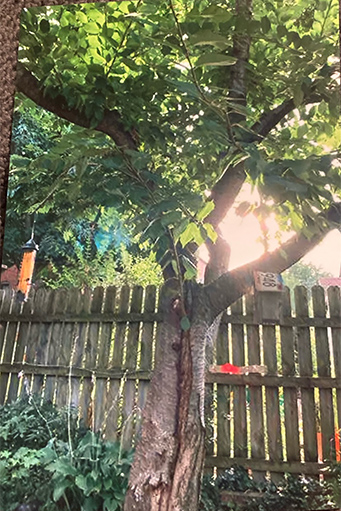
A photo of a tree taken by a student participant in the Photovoice study. The photo was categorized as a representation of nature and greenspace. (Photo courtesy of Christine Ekenga)
Although children are highly susceptible to environmental exposures, few studies examine their knowledge and experiences related to environmental health. Researchers and community partners from Emory University’s Rollins School of Public Health, Columbia University’s Mailman School of Public Health, Gateway to the Great Outdoors (a nonprofit that brings science-based learning to children across St. Louis), and the St. Louis Public School District sought to fill this research gap.
Through the project, students in St. Louis public schools used Photovoice, a method of taking pictures and describing them, to demonstrate their knowledge and experiences around environmental health. A 2023 paper describes how the community-academic partnership used the Photovoice results to develop a new theoretical framework that can help promote environmental health for children from low-income urban communities.
Conducting a Photovoice Program
Previous research has shown racial/ethnic and socioeconomic disparities in the city’s natural and built environment. These disparities can negatively affect children's health and quality of life. In the study, the researchers leveraged their ongoing partnership with St. Louis public schools to examine the environmental experiences of children from low-income households.
At the beginning of the 2020 school year, 20 students aged 10-12 were enrolled in a yearlong program consisting of weekly in-class environmental health lessons and monthly nature-based field trips. To complete the Photovoice activity, students were given cameras and instructed to take photos representing ways the environment affects their health. They took photos over the course of two weeks, then discussed the photos during one-on-one interviews with a researcher. While Photovoice interviews are often conducted in focus groups, the researchers thought the students would provide more candid responses without influence from peers.
“Photovoice is a well-established way to engage community members to share their perspectives on environmental health; however, this is not something that is usually done with children from historically marginalized communities,” reflected Christine C. Ekenga, Ph.D., MPH, assistant professor of environmental health at Emory University and principal investigator of this study. “Our study shows that Photovoice is an effective strategy for determining children’s perceptions about the environment and how it affects them.”
Developing a Framework for Children’s Environmental Health Engagement
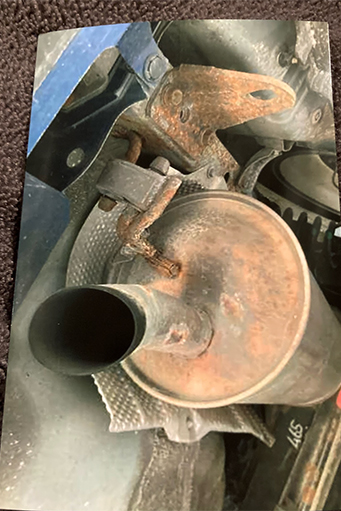
A student’s photo of the exhaust pipe from their family’s car. This photo was categorized to represent understanding of climate change because the student associated exhaust with its effects on climate change. (Photo courtesy of Christine Ekenga)
The researchers found five major themes from students’ interview responses:
- Environmental exposures.
- Environmental health outcomes.
- Environmental health sentiments.
- Environmental health solutions.
- Interest in environmental health.
Within each theme, subthemes described more specific categories. For example, when discussing photos of trees or other parts of the natural environment, students described how trees positively influence mental health and provide oxygen, and how planting more trees in the community would improve residents’ well-being. Relevant comments could fall under the environmental exposures, environmental health outcomes, and environmental health solutions themes, and could be further categorized by greenspace, positive perceptions, and community-level solutions. The team developed a framework for children’s environmental health knowledge and experiences based on how the students discussed each of the themes.
“The students’ descriptions of their photos showed us they have a wide breadth of understanding of various aspects of their environment,” said Ekenga. “Categorizing the interviews in this way led us to a deeper understanding of students’ environmental health knowledge and let their perspectives drive the research.”
The framework is also consistent with current literature, which supports the idea that all factors, including community interest, environmental health outcomes, and environmental exposures, influence the effect of an exposure on communities.
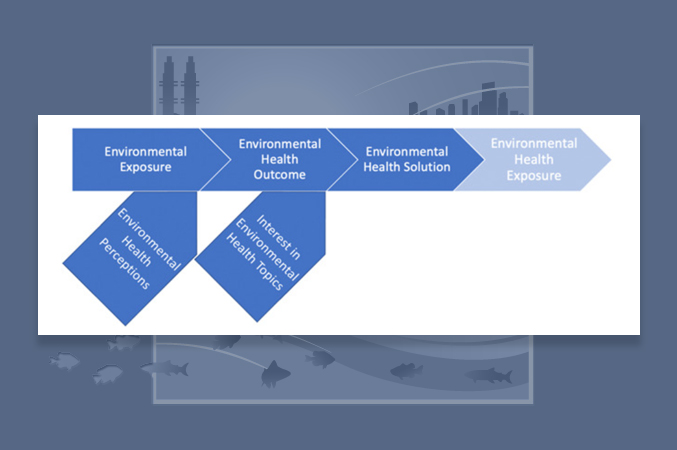
The framework developed by the research team. (Figure courtesy of Nadav Sprague, Hannah Zonnevylle, Lexi Jackson Hall, Rosalind Williams, Hannah Dains, Donghai Liang, and Christine Ekenga)
The researchers intend to use the framework in the future to guide how they engage with children in their work in St. Louis. They also plan to use the five categories from the analysis when designing surveys. The research team believes the study demonstrates Photovoice’s utility when conducting community-based participatory research with children. Other teams could conduct similar research in other communities to determine the factors that influence children’s environmental health perceptions in those settings.
NIH Requests Information From Public on Environmental Justice Research Gaps and Opportunities
The NIH Environmental Justice Working Group, which is led by Trevor Archer, Ph.D., Deputy Director of NIEHS, is seeking feedback from the public about how NIH can support research and capacity-building related to environmental justice. The request for information also supports Executive Order 14096 on Revitalizing Our Nation’s Commitment to Environmental Justice for All, which was released in April 2023 and calls for a whole-of-government approach in working toward environmental justice. Through the request for information, NIH is seeking comments from communities with environmental justice concerns, scientific researchers, community-based organizations, consumer advocacy groups, service agencies, and the public to identify gaps and opportunities in areas such as environmental justice research and action, scientific infrastructure, community partnerships to address environmental injustices, and science communication and dissemination of research findings. Responses are due December 15. Read the notice in its entirety.
Pictorial Report-Back Materials May Aid Understanding of Well Water Safety
A NIEHS-funded team working with participants in North Carolina on well water safety is studying what makes effective report-back materials. After working with residents concerned about toxic metals in local wells to reduce exposure, the team wanted to determine whether pictorial report-back materials were effective and whether such materials helped people take health-protective actions. In a pilot test, the researchers found that participants thought pictorial results of contaminant levels in well water and soil were easy to understand. Moreover, participants thought the detailed supplementary material, which included definitions and contaminant fact sheets, was helpful. Building on that understanding, some participants took safety-related actions, such as replacing pipes and installing filters, based on their individualized results. However, the researchers also found that in follow-up surveys testing residents’ recall of their results, many could not recall which contaminants were present in their water. The team expanded the pilot study and is analyzing data from additional participants. They report the results of their pilot test of report-back materials in an April 2023 paper. Another project that characterized toxic metals from drinking water wells using an environmental justice index was described in the February 2023 PEPH newsletter.
Relaunched Journal of Health and Pollution Accepting Publications on Research in Communities with Underdeveloped Research Infrastructure
The Journal of Health and Pollution started accepting manuscript submissions in September. The journal publishes research that addresses environmental health issues in lower-resourced areas with underdeveloped research infrastructure. Published articles will examine the relationship between environmental exposures and human health in areas such as the health effects of climate change, exposures to environmental contaminants, and environmental health studies that incorporate Indigenous and local knowledge. The journal was donated to NIEHS in 2022 and is a sister publication to the Environmental Health Perspectives journal.
NIH Awards Grants to Community-Led Research Programs
NIH announced awards in September for its new community-led research program, aimed at addressing underlying structural factors that affect health. The NIH Common Fund Community Partnerships to Advance Science for Society (ComPASS) program directly funds projects led by community organizations. Organizational leaders will collaborate with research partners at academic institutions at all phases of the research. Each project will support strategies to improve health outcomes through structural interventions that address community concerns such as neighborhood characteristics, nutrition and food environment, and health care access and quality. For example, one project will support access to healthy food in underserved rural communities through delivery of food boxes and facilitation of local food harvesting and distribution, and another will provide individualized travel resources, including a stipend, to support access to health care. The program gave 25 awards to community organizations and one award to a coordinating center.
Research Team Incorporates Diné Perspectives and Engages in Health Dialogue to Report Back Results
NIEHS-funded researchers and Navajo (Diné) community partners have been improving environmental public health and communications in the context of the Gold King Mine Spill, a disaster in which millions of gallons of contaminants were released into a river that runs through the Navajo Nation. Previously, the research team used focus groups to learn about Indigenous worldviews and take them into consideration. The results of the focus groups informed the team’s ongoing research and have been used to help the community mitigate the effects of the spill. In July 2023, the team published a paper that describes their risk assessment of the Diné’s exposure to lead and arsenic following the spill, the first assessment that incorporates the Diné people’s unique exposure pathways. In August, the team published a paper that describes how they reported back individualized study results with culturally responsive communication. The team emphasizes the importance of environmental health dialogue in reporting back research results to make information useful to participants. Environmental health dialogue is a combination of ways of knowing among partners that emphasizes equity and community-driven processes, and the team says the dialogue reshaped researcher-only concepts of content. Learn more about the Gold King Mine Spill – Diné Exposure Project.
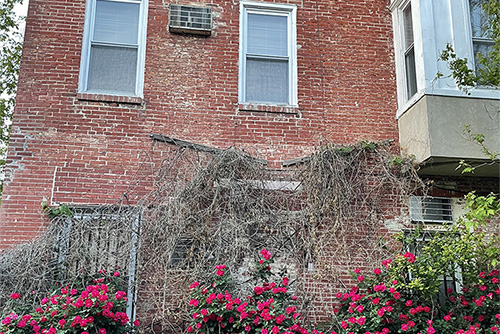
PEPH Environmental Health Chat Podcast Series
Protecting Communities From Lead Exposure
PEPH Environmental Health Chat Podcast Series
Protecting Communities From Lead Exposure
Lead, even at low levels of exposure, remains a health risk for children. Marilyn Howarth, M.D., works with community partners to develop a better understanding of the factors associated with lead exposure risk in Philadelphia. In our latest podcast, she talks about a map her team developed that can help decision-makers identify and prioritize neighborhoods for cleanup. Howarth is the director of the Community Engagement Core at the University of Pennsylvania’s NIEHS-funded Center of Excellence in Environmental Toxicology and of the Philadelphia Regional Center for Children’s Environmental Health. The team’s project was featured in the March 2022 PEPH newsletter.

PEPH Grantee Highlight
Jennifer Richmond-Bryant, Ph.D.
“If your work isn’t consistent with what the community is experiencing, then it doesn’t make sense to pursue. It’s our responsibility to support the communities that let us in and allow us to collect data,” said Jennifer Richmond-Bryant, Ph.D., an investigator with the NIEHS-funded Louisiana State University Superfund Research Program and co-investigator for the center’s Community Engagement Core. Her current research, which involves studying air pollution levels in Louisiana, was inspired by community concerns about the health effects of open burning at a hazardous waste thermal treatment plant in Colfax, Louisiana. Richmond-Bryant’s team presented their data to the Louisiana Department of Environmental Quality, which then prohibited open burning at the treatment plant. The team will continue to monitor air quality to see how things change with the end of open burning. Read more about grantee.
Funding Opportunities
Exploratory Grants for Climate Change and Health Research Center Development (P20 Clinical Trial Optional)
Supports the development of an innovative research environment to foster and sustain a transdisciplinary program of fundamental and applied research to explore the complex impacts of climate change on health and to develop action-oriented strategies that protect health and build resiliency at the individual, community, national and global levels. A major goal for this program is to build research teams as well as collaborations with communities and other key partners. The program seeks innovative research and pilot/feasibility projects that utilize transdisciplinary approaches to address questions relevant to climate change impacts on health. Applications for these Climate Change and Health Research Development Centers should propose planning and development activities in preparation to build institutional research capacity for future proposals addressing climate and health. NIH held an informational webinar/Q&A session March 24, from 1:00pm-3:00pm EDT. The slides and a Frequently Asked Questions document will be available following the session. Please feel free to reach out to the NIEHS Scientific/Research Point of Contact, Abee Boyles, if you are unable to attend the session or have additional questions.
Deadlines: May 1, 2023; November 7, 2023
Center for Exposome Research Coordination to Accelerate Precision Environmental Health (U24 Clinical Trial Not Allowed)
Promotes methods standardization, harmonization, and best practices in operationalizing exposomics in the U.S. and around the world, which will be achieved by working with existing exposome research initiatives, infrastructures, and resources. The funding opportunity also emphasizes the importance of supporting diverse perspectives in the exposomics community through sharing resources, education and capacity building, and transdisciplinary collaborations. The Center for Exposome Research Coordination (CERC) will engage various groups and communities that are relevant to better operationalize exposomics and accelerate precision environmental health. The CERC is expected to work with the exposome research community and international partners (including the European Global Coordination of Exposome Research) in the following areas:
Deadline: November 30, 2023
Research Supplements to Promote Diversity in Health-Related Research (Admin Supp — Clinical Trial Not Allowed)
Supports administrative supplements to recruit and support high school, undergraduate and graduate/clinical students, postbaccalaureate and post-Master’s individuals, postdoctoral researchers (including health professionals), and eligible investigators. NIH encourages institutions to diversify their student, postdoctoral researchers, and faculty populations to enhance the participation of individuals from groups that are underrepresented in the biomedical, clinical, behavioral, and social sciences, such as individuals from racial and ethnic groups that have been underrepresented in the sciences; individuals with disabilities; individuals from disadvantaged backgrounds; and women from disadvantaged backgrounds.
Deadlines: October 2, 2023; December 1, 2023; February 1, 2024
Time-Sensitive Research Opportunities in Environmental Health Sciences (R21 Clinical Trial Not Allowed)
Supports research in environmental health science in which an event has or will imminently occur that provides a limited window of opportunity to collect samples and data to support the assessment of exposures and human health impact. The goal of the program is to characterize initial exposures, collect human biological samples, or collect human health and exposure data in order to provide critical information to understand exposure-health outcome relationships, with the goal of providing data that will facilitate timely action to protect public health. The program also supports the use of innovative techniques (hazard identification, sensing and mitigation technologies) that are uniquely valuable for deployment at a time of disaster to inform our understanding of the human health impacts of the disaster.
Deadlines: April 3, 2023; June 1, 2023
Ruth L. Kirschstein National Research Service Award (NRSA) Individual Predoctoral Fellowship (Parent F31)
The Ruth L. Kirschstein NRSA Individual Predoctoral Fellowship (Parent F31) award enables promising predoctoral students to obtain individualized, mentored research training from outstanding faculty sponsors while conducting dissertation research in scientific health-related fields relevant to the missions of participating NIH Institutes and Centers. The proposed mentored research training must reflect the candidate’s dissertation research project and is expected to clearly enhance the individual’s potential to develop into a productive, independent research scientist. Funding opportunities are also open for the Ruth L. Kirschstein NRSA Individual Fellowship for Students at Institutions with NIH-Funded Institutional Predoctoral Dual-Degree Training Programs (Parent F30), that supports promising predoctoral students who are matriculated in a combined M.D./Ph.D. or other dual-doctoral degree training program, and who intend careers as physician/clinician-scientists, and the Ruth L. Kirschstein NRSA Individual Senior Fellowship (Parent F33), that supports experienced scientists who wish to make major changes in the direction of their research careers or who wish to broaden their scientific background by acquiring new research capabilities as independent investigators in research fields relevant to the missions of participating NIH Institutes and Centers.
Deadlines: December 8, 2023; April 8, 2024
PHS 2023-2 Omnibus Solicitation of the NIH and CDC for Small Business Innovation Research Grant Applications (Parent SBIR [R43/R44] Clinical Trial Required)
Invites eligible United States small business concerns to submit Small Business Innovation Research (SBIR) Phase I, Phase II, Direct to Phase II (NIH only), Fast-Track (NIH only), and Phase IIB (NIH only) grant applications. The PHS 2023 -2 SBIR/STTR Program Descriptions and Research Topics for NIH, CDC, and FDA represent scientific program areas that may be of interest to applicant small businesses in the development of projects that have potential for commercialization. Small business concerns that have the research capabilities and technological expertise to contribute to the research and development mission(s) of the NIH and CDC awarding components identified in this funding opportunity are encouraged to submit SBIR grant applications in these areas. A related SBIR funding opportunity is available without a clinical trial requirement: PHS 2023-2 Omnibus Solicitation of the NIH, CDC and FDA for Small Business Innovation Research Grant Applications (Parent SBIR [R43/R44] Clinical Trial Not Allowed). Related funding opportunities are available for small business applicants interested in submitting small business technology transfer (STTR) applications: PHS 2023-2 Omnibus Solicitation of the NIH for Small Business Technology Transfer Grant Applications (Parent STTR [R41/R42] Clinical Trial Not Allowed) and PHS 2023-2 Omnibus Solicitation of the NIH for Small Business Technology Transfer Grant Applications (Parent STTR [R41/R42] Clinical Trial Required).
Deadlines: September 5, 2023; January 5, 2024; April 5, 2024
SBIR/STTR Commercialization Readiness Pilot (CRP) Program Technical Assistance and Late Stage Development (SB1, Clinical Trial Not Allowed)
Encourages applications from small business concerns to the newly re-authorized Commercialization Readiness Pilot (CRP) program. The funding opportunity aims to facilitate the transition of previously or currently funded Small Business Innovation Research (SBIR) and Small Business Technology Transfer (STTR) Phase II and Phase IIB projects to the commercialization stage by providing additional support for technical assistance and later stage research and development not typically supported through Phase II or Phase IIB grants or contracts. This may include independent replication of key studies, Investigational New Drug-enabling studies, clinical studies, manufacturing costs, regulatory assistance, or a combination of services. Although a significant amount of the work in a CRP award may be subcontracted to other institutions, the small business concern is expected to maintain oversight and management of research and development throughout the award.
Deadlines: September 5, 2023; January 5, 2024; April 5, 2024
HHS Environmental Justice Community Innovator Challenge
The Office of the Assistant Secretary for Health and the Office of Minority Health are seeking community-led strategies and tools to address health disparities in communities disproportionately impacted by environmental risks and hazards including those related to climate change, and the cumulative impacts of other stressors. This Challenge seeks to support to community-based and Tribal organizations in areas including, but not limited to: development or implementation community-driven strategies to address health disparities; effective partnerships between community-based or Tribal organizations and other civil organizations, such as faith-based, healthcare and public health and educational organizations, to address environmental and climate change-related hazards and support community resilience; and innovative approaches to building capacity in community-based or Tribal organizations on project planning, needs assessment, budgeting, engagement with community members, and grant application writing, to address environmental and climate change-related hazards as drivers of health disparities. The competition has two phases. All eligible submissions will be evaluated, and separate prizes will be awarded for each of the two phases. The first phase is currently open for submissions. There will be a general informational webinar on October 10, and an information webinar for Tribal organizations on October 12.
Deadline: January 30, 2024
Research With Activities Related to Diversity (ReWARD) (R01 Clinical Trial Optional)
ReWARD funding will support research in areas related to the programmatic interests of NIEHS and ongoing diversity, equity, inclusion, and accessibility activities focused on enhancing diversity in the biomedical research enterprise within the U.S. and territories. This funding is intended for individuals with no current NIH research project grant funding at the time of the award. This announcement requires a Plan for Enhancing Diverse Perspectives as part of the application.
Deadlines: June 5, 2023; October 5, 2023; February 5, 2024
Intervention Research to Improve Native American Health (R01 Clinical Trial Optional)
Supports research on interventions to improve health in Native American (NA) populations. This includes 1) etiologic research, where there is a significant gap in knowledge, that will directly inform intervention development or adaptations, 2) research that develops, adapts, or tests the efficacy or effectiveness of health promotion and disease prevention interventions, 3) research that tests culturally informed treatment or recovery interventions and 4) where a sufficient body of knowledge on intervention efficacy exists, research on dissemination and implementation that develops and tests strategies to overcome barriers to the adoption, integration, scale-up, and sustainability of effective interventions. Through this initiative, intervention and related research is sought to build upon community knowledge, resources, and resilience to test science-based, culturally appropriate solutions to reduce morbidity and mortality through identification and remediation of precursors to diseases and disorders and through culturally informed treatment.
Deadline: May 17, 2021; May 17, 2022; May 17, 2023
Letter of Intent: Due 30 days prior to the application due date
Upcoming PEPH-related Events




